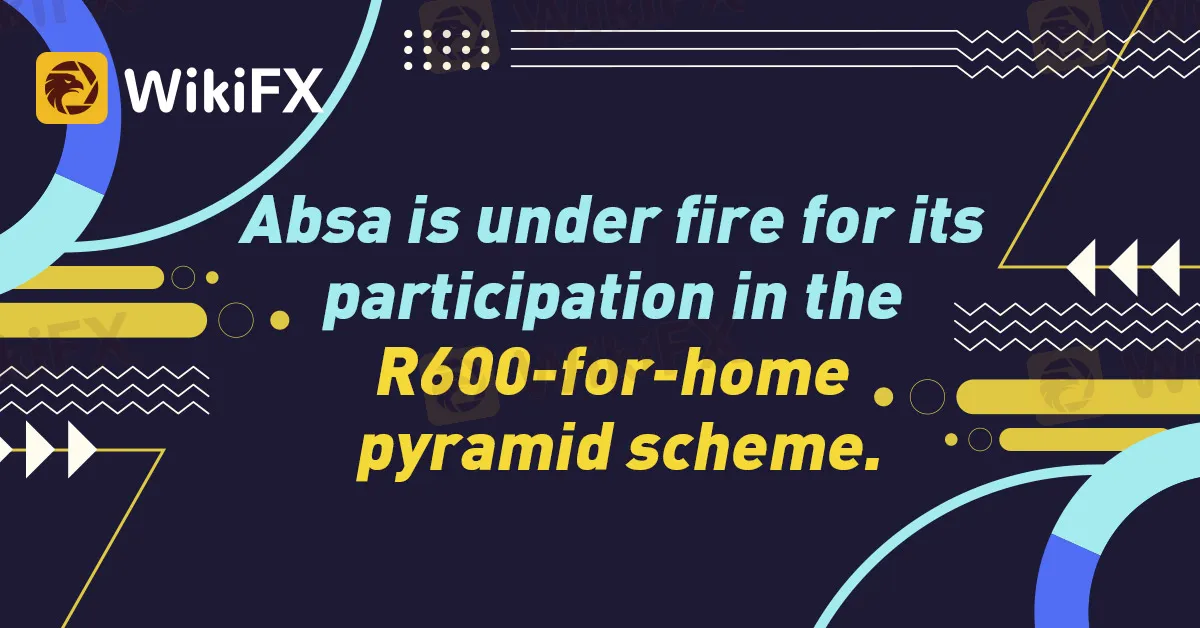简体中文
繁體中文
English
Pусский
日本語
ภาษาไทย
Tiếng Việt
Bahasa Indonesia
Español
हिन्दी
Filippiiniläinen
Français
Deutsch
Português
Türkçe
한국어
العربية
Absa is under fire for its participation in the R600-for-home pyramid scheme.
Abstract:Following revelations that one of their accounts was exploited in a pyramid scam that claimed to provide houses for the underprivileged for R600, ABSA is under fire for its inaction.

Following revelations that one of their accounts was exploited in a pyramid scam that claimed to provide houses for the underprivileged for R600, ABSA is under fire for its inaction.
As a result of claims that one of their accounts was utilized in a pyramid scam that claimed to build houses for the underprivileged for R600, ABSA is under fire for its inaction.
The Star has received a letter that EFF members in Johannesburg sent to a bank begging with it to freeze the accounts of South Jozi, a real estate development company that has been defrauding the underprivileged by promising them inexpensive houses in exchange for their money.
The group was discovered for depriving the poor of their aspirations of owning homes and for stealing from them, yet it continued to operate using an Absa account.
The EFF said in the letter that because the group was using an Absa account, consumers believed the claim that they could buy a property for for R600.
South Jozi allegedly collaborated with the Chinese government to construct housing for the underprivileged in South Africa.
Our estimation is that more than R10 million was transferred in and out of the account, which obviously implies money laundering. The issue then arises as to why Absa failed to alert the authorities to a possible pyramid scheme.
The EFF stated that because “the majority of our people trusted the bank more in this area, we want the bank to clarify its stance.”
The EFF in Johannesburg claimed that it was contacted by community members in some townships who were upset because South Jozi had failed to deliver the houses that residents had been promised.
It was believed that South Johannesburg duped about 2000 individuals.
Members of our community who had benefited from a housing project named South Jozi approached EFF in ward 128 because they thought something wasn't right with how the project was progressing; as a result, the branch resolved to check out what was going on with the project.
According to the party's first findings, one of its members was involved in the fraud.
The member had served as the branch's deputy chairperson until he resigned, according to the EFF.
Even after The Star exposed the housing fraud, consumers are being encouraged to borrow additional money during meetings in order to purchase homes.
Meetings were organized over the weekend by some of the project's advisers, who asked individuals who wanted refunds to express this and those who wanted houses to move on with the process.
Absa was asked a number of questions by The Star, the most of which went unanswered.
The organization said that the bank instead issued the following statement: “Absa is investigating the incident and will reply to the impacted persons at the proper time.”
Police stated that they were also looking into it.

Disclaimer:
The views in this article only represent the author's personal views, and do not constitute investment advice on this platform. This platform does not guarantee the accuracy, completeness and timeliness of the information in the article, and will not be liable for any loss caused by the use of or reliance on the information in the article.
Read more

MultiBank Group Wins Big at Traders Fair Hong Kong 2024
Discover how MultiBank Group, a global leader in financial derivatives, secured three prestigious awards at Traders Fair Hong Kong 2024, highlighting its innovative trading solutions and industry excellence.

CySEC Settles Compliance Case with Fxview Operator Charlgate Ltd
Discover how CySEC resolved compliance issues with Charlgate Ltd, the operator of Fxview, through a €50,000 settlement. Explore the investigation, regulatory measures, and CySEC's new website designed for improved accessibility and transparency.

TradingView Launches Liquidity Analysis Tool DEX Screener
Discover TradingView's DEX Screener, a powerful tool for analyzing decentralized exchange trading pairs. Access metrics like liquidity, trading volume, and FDV to make smarter, data-driven trading decisions.

WikiFX Review: Is PU Prime a decent broker?
In today’s article, we have made a comprehensive review of a broker named PU Prime. We wonder if PU Prime is a scam or a reliable broker.
WikiFX Broker
Latest News
Geopolitical Events: What They Are & Their Impact?
Volkswagen agrees deal to avoid Germany plant closures
Top 10 Trading Indicators Every Forex Trader Should Know
TradingView Launches Liquidity Analysis Tool DEX Screener
MultiBank Group Wins Big at Traders Fair Hong Kong 2024
WikiEXPO Global Expert Interview: Simone Martin—— Exploring Financial Regulation Change
'Young investors make investment decisions impulsively to keep up with current trends' FCA Reveals
Why Do You Feel Scared During Trade Execution?
CySEC Settles Compliance Case with Fxview Operator Charlgate Ltd
Malaysian Influencer Detained in Taiwan Over Alleged Role in Fraud Scheme
Currency Calculator


